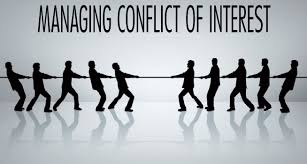The Importance of Conflicts of Interest Compliance
 Character and personal force are the only investments that are worth anything. – Walt Whitman
Character and personal force are the only investments that are worth anything. – Walt Whitman
A company’s character includes avoiding the appearance of, or actual, conflicts of interest. Compliance professionals need to pay more attention to conflicts of interest. In some instances, companies have not even adopted conflict of interest compliance policies. Some companies have a mere mention of the principle in their code of conduct.
Conflict of interest investigations and violations usually hide more significant code and legal violations. Once you scratch the surface on a conflict of interest situation, investigators often find there is much more to the situation, usually involving fraud, kickbacks and possibly bribery.
There is a lot of nuance to conflicts of interest. Some potential conflicts are relatively easy to analyze. Others can present more difficult line drawing issues.
Employees who seek personal benefits from company relationships are often caught in serious conflicts. An employee who supervises significant contractors can have plenty of motive and opportunities to seek personal benefits, either from kickbacks or from in-kind personal services.
Internal controls in the contracting process have to be designed and enforced to ensure that conflicts are not created and opportunities to game the system are eliminated. Usually this involves creating multiple internal reviews and approvals, along with multiple authorizations for contracting, issuing invoices and payments.
There are other permutations that can raise conflicts of interest risks that need to be addressed. Personal activities, inter-personal relationships and other activities can create situations where managers and employees have divided loyalties.
Conflicts of interest can undermine a company’s culture. If a company is not vigilant in identifying and conflicts of interest, especially at the senior management level, the company’s culture can be threatened.
CEOs and other senior executives have been at the center of some significant ethical lapses. Ethical lapses such as inappropriate personal relationships with subordinates or misrepresentations of qualifications and other fraudulent activity can set a company’s culture back. CCOs often are responsible for monitoring and enforcing conflicts of interest policies. As part of this responsibility, CCOs have to ensure that conflict of interest allegations are quickly and thoroughly investigated and resolved.
 Even at the higher levels of corporate management, conflicts of interest can occur and create serious problems. Senior executives accused of conflict of interest violations have to be investigated thoroughly and disciplined in accordance with company standards.
Even at the higher levels of corporate management, conflicts of interest can occur and create serious problems. Senior executives accused of conflict of interest violations have to be investigated thoroughly and disciplined in accordance with company standards.
Several years ago, the Best Buy Chairman was forced to resign in disgrace after failing to report an important personal conflict of interest. Best Buy’s Chairman was aware that the CEO was having an improper affair with a young subordinate but failed to disclose or report the affair to the board or any other corporate official. As a result, Best Buy’s Chairman and CEO were forced to leave Best Buy. Their conduct did not involve personal gain but established a complete disregard of the company’s ethics policies and values.
Ethical lapses are often the result of weak conflicts of interest controls and training. To ensure that a culture of integrity is protected, CCOs have to be vigilant in promoting a conflict of interest compliance policy and investigating potential violations of such policy.















